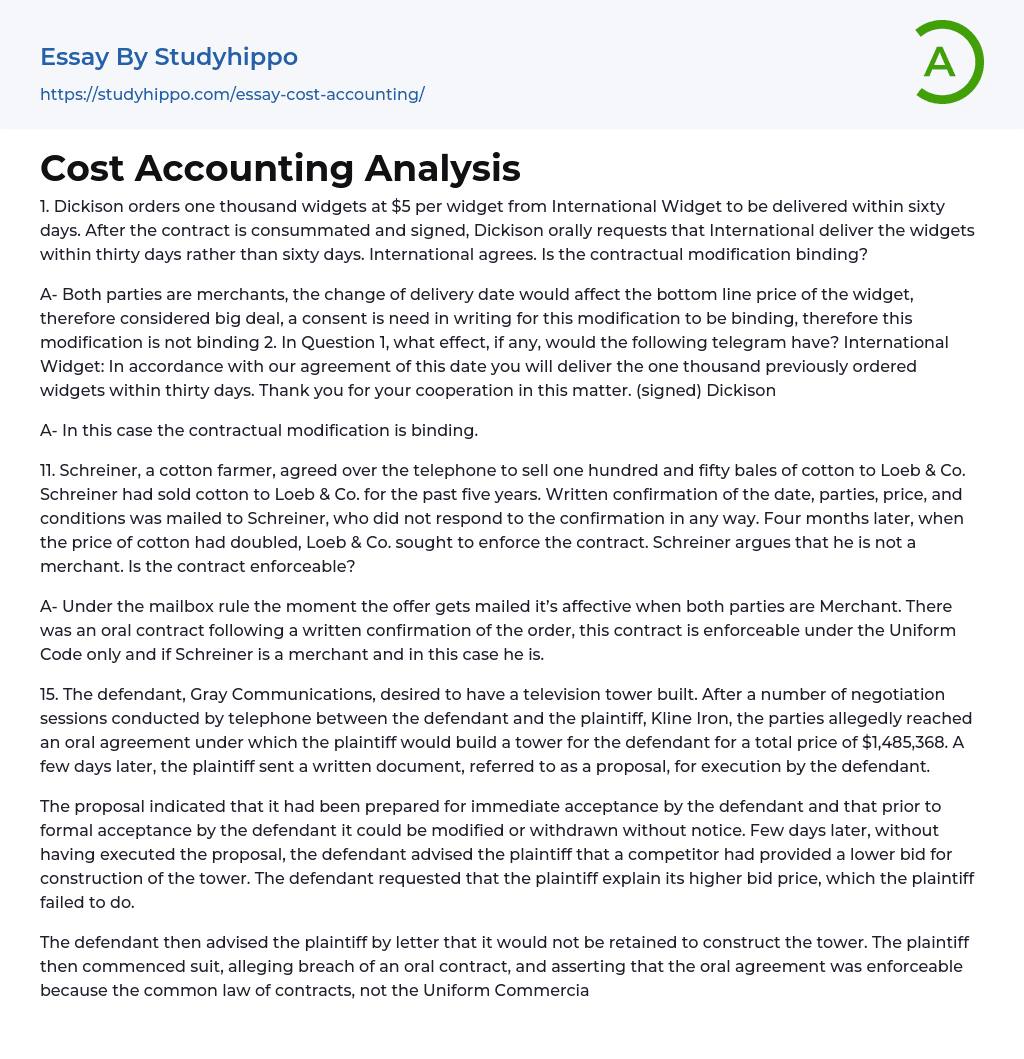Initially, Dickison orders 1000 widgets from International Widget at a cost of $5 per widget and requests a delivery timeframe of sixty days. However, after signing the contract, Dickison verbally asks International to expedite the delivery to thirty days. International agrees to this change. The question is whether this modification holds legal weight.
Both parties are merchants, and changing the delivery date of the widget would greatly affect its price. Therefore, it is considered a significant matter that requires written consent for the modification to be legally binding. However, the mentioned modification is not currently binding.
Regarding Question 1, the provided telegram from International Widget will have the following impact:
"As per our agreement on today's date, you are required to deliver the previously ordere
...d one thousand widgets within thirty days. We appreciate your cooperation in this regard." (signed) Dickison
A- The contractual modification in this case is legally obligatory.
11. Schreiner, a cotton farmer, agreed to sell 150 bales of cotton to Loeb & Co. via telephone. For the past five years, Schreiner has been selling cotton to Loeb & Co. A written confirmation containing the agreement's date, parties involved, price, and terms was sent to Schreiner but received no response from him. Four months later, when the price of cotton had doubled, Loeb & Co attempted to enforce the contract. However, Schreiner argues that he is not considered a merchant. The main issue at hand is whether or not the contract can be enforced.
According to the mailbox rule, when both parties involved in a contract are merchants, the offer is considered effective as soon
as it is mailed. In this case, there was an oral contract that was later confirmed in writing. The enforcement of this contract falls under the Uniform Code and applies specifically to Schreiner since he is a merchant.
15. Gray Communications, the defendant, wanted to construct a television tower. After several phone negotiations with Kline Iron, the plaintiff, it is claimed that both parties came to an oral agreement. According to this agreement, the plaintiff would build a tower for the defendant for a total price of $1,485,368. Shortly after, the plaintiff sent a written proposal document to the defendant for signing.
The plaintiff initially presented a proposal to the defendant, which could be altered or revoked prior to formal acceptance. However, the defendant subsequently notified the plaintiff about a rival company's lower bid for building the tower, without accepting the original proposal. The defendant asked for an explanation regarding the higher bid price from the plaintiff, but no justification was given.
The plaintiff started legal proceedings after receiving a letter from the defendant informing them that they would not be hired to build the tower. The lawsuit alleges that there was a breach of an oral agreement and asserts that this agreement can be enforced under common law instead of the Uniform Commercial Code (UCC). The plaintiff argues that this transaction does not need to adhere to common law. Alternatively, if the UCC is applicable, they contend that it falls within the "merchant's exception" provision. The main question at hand is whether or not the contract can be upheld.
The contract cannot be enforced because of the defendant's
written proposal. The proposal stated that the contract could be changed or canceled before the defendant formally accepted it. Regardless of why the plaintiff terminated it, as long as they gave written notice to the defendant and the contract was still not accepted.
- Breach Of Contract essays
- Agreement essays
- Business Law essays
- Common Law essays
- Community Policing essays
- Constitution essays
- Consumer Protection essays
- Contract essays
- Contract Law essays
- Copyright Infringement essays
- Court essays
- Crime essays
- Criminal Law essays
- Employment Law essays
- Family Law essays
- Injustice essays
- Judge essays
- Jury essays
- Justice essays
- Lawsuit essays
- Lawyer essays
- Marijuana Legalization essays
- Ownership essays
- Police essays
- Property essays
- Protection essays
- Security essays
- Tort Law essays
- Treaty essays
- United States Constitution essays
- War on Drugs essays
- Audit essays
- Budgeting essays
- Cost Accounting essays




